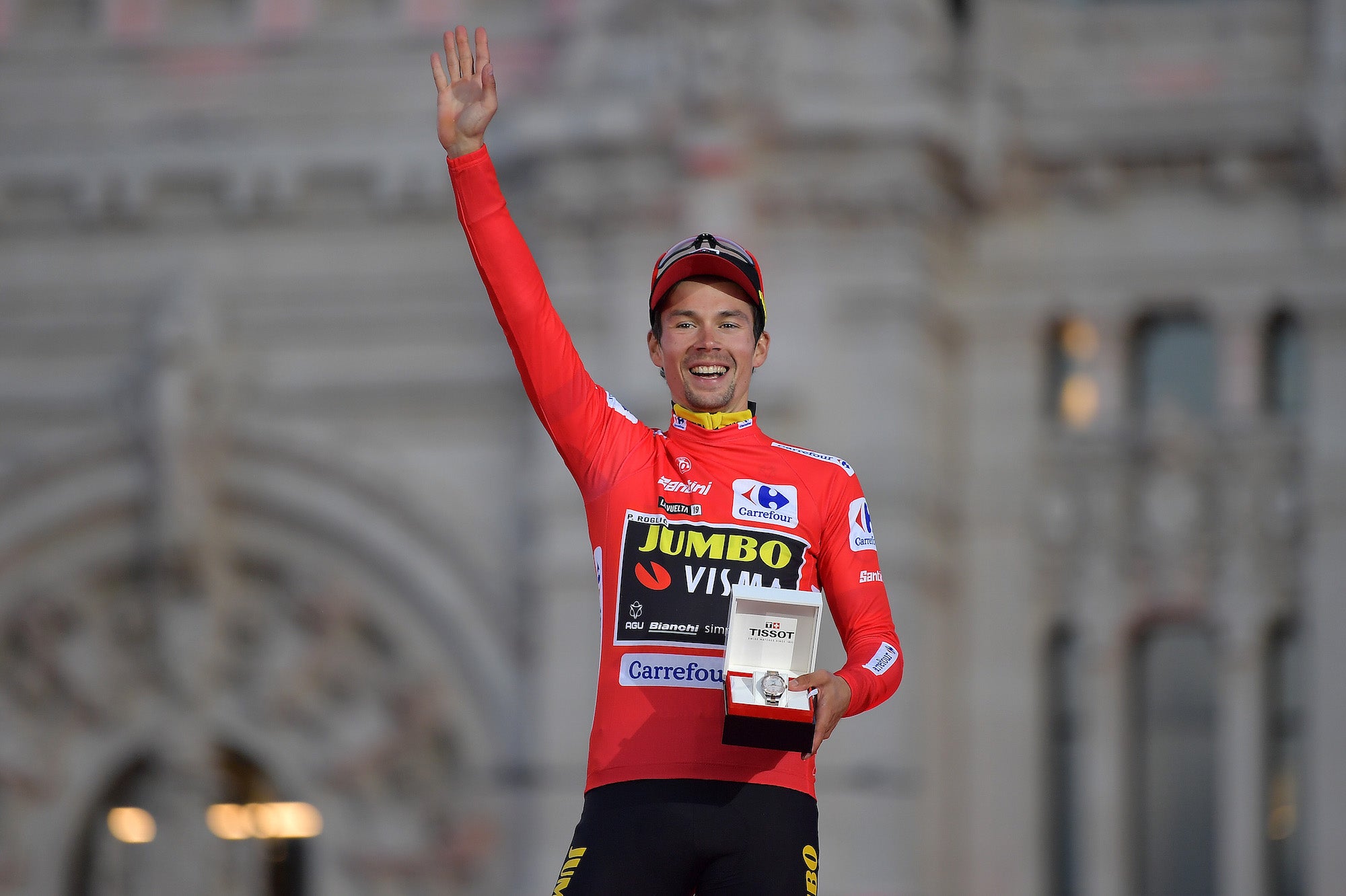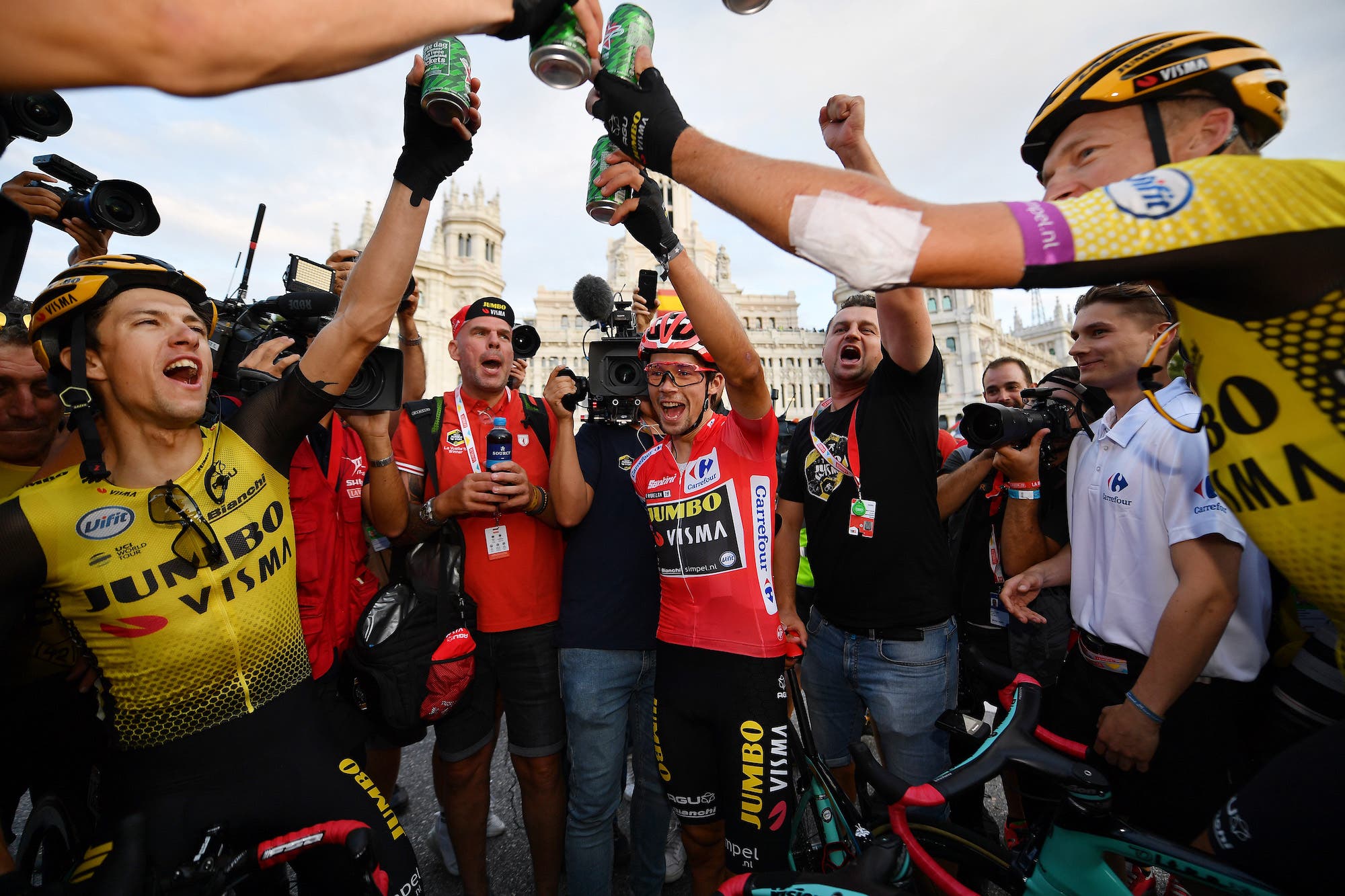With breakthrough Vuelta crown, Roglic can finally smile in Madrid

Photo: Justin Setterfield/Getty Images
It’s been an intense three weeks for Primoz Roglic, and after crossing the finish line Sunday in Madrid, he can finally breathe easy. And smile.
If it didn’t seem like Roglic was enjoying this Vuelta a España throughout the past intense three weeks, well, he could finally let down his guard as the pack rolled into downtown Madrid for the final trot across the line.
“I am very happy,” Roglic said Sunday. “I am relieved that we have been able to bring this to a close successfully.”
The Jumbo-Visma captain made history Sunday at many levels: the first Slovenian to win a grand tour, the first for his rebranded franchise, and yes, the first for a former ski jumper.
“A lot of things have happened very fast,” he said. “I changed from skis to bikes. I started as an amateur until now I race with the best. It was a very fast evolution.”
His first grand tour victory was complete at every level. He won one stage — the time trial in Pau that put him over the top — and he was in the front in every key mountain stage in the race. In contrast to the Giro d’Italia in May, Roglic made no costly mistakes that jeopardized his chances for victory.
Surrounded by a strong and deep Jumbo-Visma, Roglic seemed impermeable during a wild Vuelta that continued on cycling’s changing of the guard. Roglic never panicked, and he always followed the right moves.
It was clear he learned something from the Giro d’Italia in May, when he scraped his way onto the podium with third.
“I never thought [the race was lost],” Roglic said. “It was not the easiest Vuelta for me, not with so much luck. I had a strong team around me, and I managed to have everything under control.”
There were crashes — in the opening team time trial, on the gravel in the rain-soaked Pyrénées in Andorra and again during Friday’s controversial stage — but each time, Roglic evaded serious injury.
Unlike the Giro d’Italia in May, when he started as the red-hot favorite only to succumb to superior rivals, Roglic raced a near-perfect Vuelta.
“It was 20 crazy days of racing,” Roglic said. “Every day was very intense.”
In a Vuelta that was missing some marquee names, Roglic started as the favorite and lived up to expectations. Roglic adroitly handled his rivals, marking them in the mountains, even attacking when the moment was right, and used his time trial skills to press home the advantage.

Alejandro Valverde (Movistar) was a constant presence, but the aging world champion gave up too much time in Pau, and could never come over the top of Roglic in the mountains. Tadej Pogacar (UAE-Emirates) was the revelation of the Vuelta, winning three stages and finishing third. An inconsistent Miguel Ángel López (Astana) confirmed he still has a way to go before he can seriously challenge for a grand tour title. Nairo Quintana (Movistar) fought bravely and won a stage, but never seemed truly in the hunt despite riding into podium range going into the final week.
Though Roglic made it look easy, he dodged more than a few bullets along the way.
The biggest dangers came from unexpected places. The crashes could take anyone out at any time. The other came in the crosswinds across the windswept meseta of northern Spain in stage 17. The race blew up, but Jumbo-Visma found some allies to keep Roglic in red.
“It has been three difficult and tough weeks with many ups and downs,” Roglic said. “The many crashes and setbacks especially made it mentally difficult.”
Roglic, however, remained enigmatic and standoffish to the press corps. Naturally shy and perhaps uncomfortable with the attention that comes with being the race leader, Roglic gave short shrift to the press pack, often briefly answering three questions before walking out of a press conference.
For journalists accustomed to gregarious and expressive winners, such as Chris Froome or Alberto Contador, it was hard for the Spanish media to warm up to this Slovenian interloper.
“I am very happy,” Roglic said of his victory. “Until now, I have been smiling in secret places. Now I can smile more openly.”
Even if some in the press box were grumbling, Roglic leaves the Vuelta a legitimate grand tour powerhouse. Packing world-class climbing and time trial skills, he claims the overall title in just his fifth grand tour start.
At 29, Roglic is still relatively young by racing years. He left ski jumping in 2012, and made the incredible transformation into an elite cyclist. Roglic clearly had the natural engine and picked up the racing quickly to survive in the bunch. Since joining his Dutch team in 2016, his evolution at the WorldTour has been impressive by every measure.
Going into 2020, he will be backed by an even stronger Jumbo-Visma that sees the arrival of Tom Dumoulin. Management isn’t letting him go anywhere, and announced a four-year contract extension to keep him in Jumbo-Visma colors through 2023.
When asked if he can now win the Tour de France, he replied, “Sure, why not?”
Now with the backing of the ever-improving Jumbo-Visma, and the confidence that will come with the Vuelta victory, the Tour de France will be Roglic’s next mountain to climb.